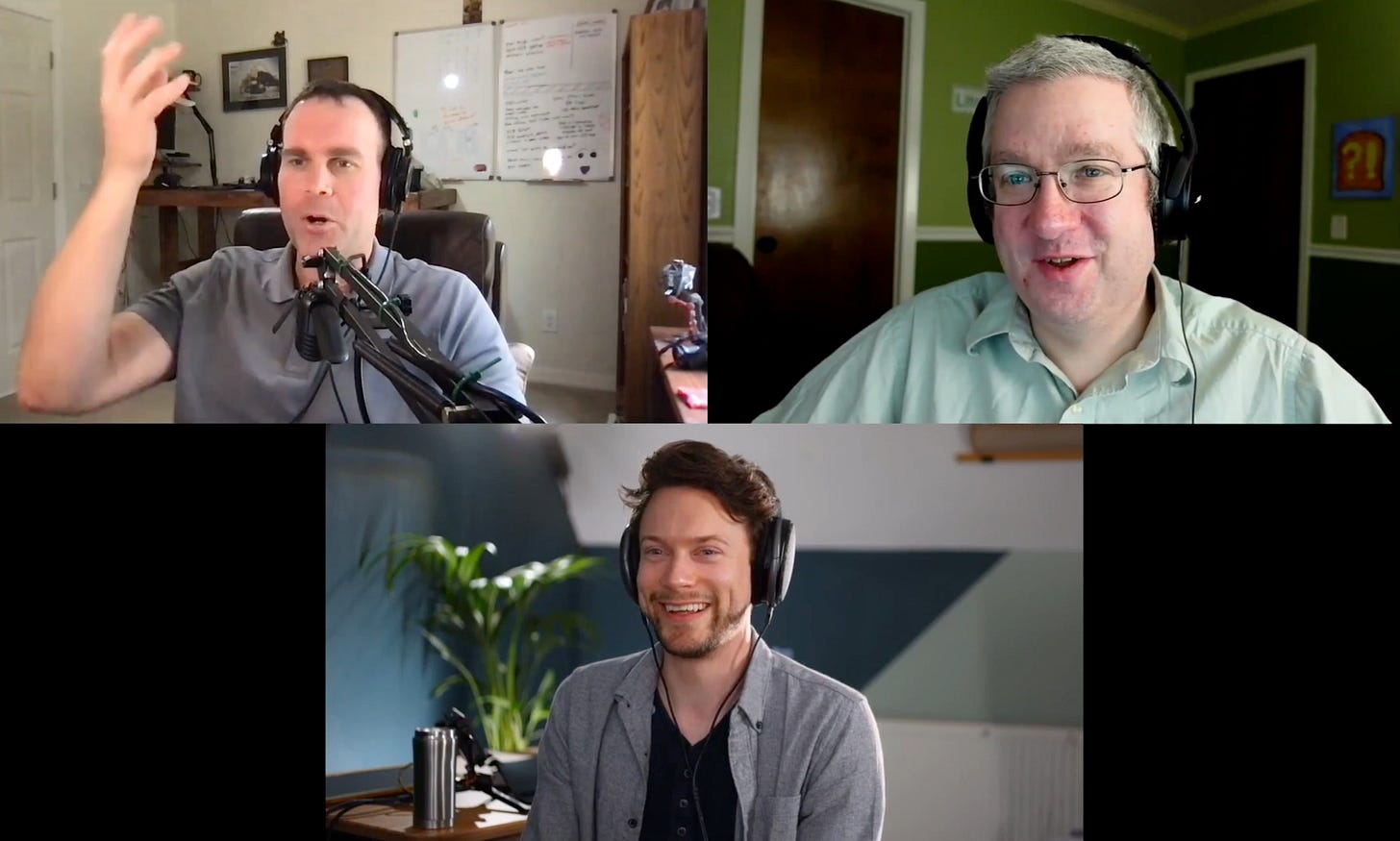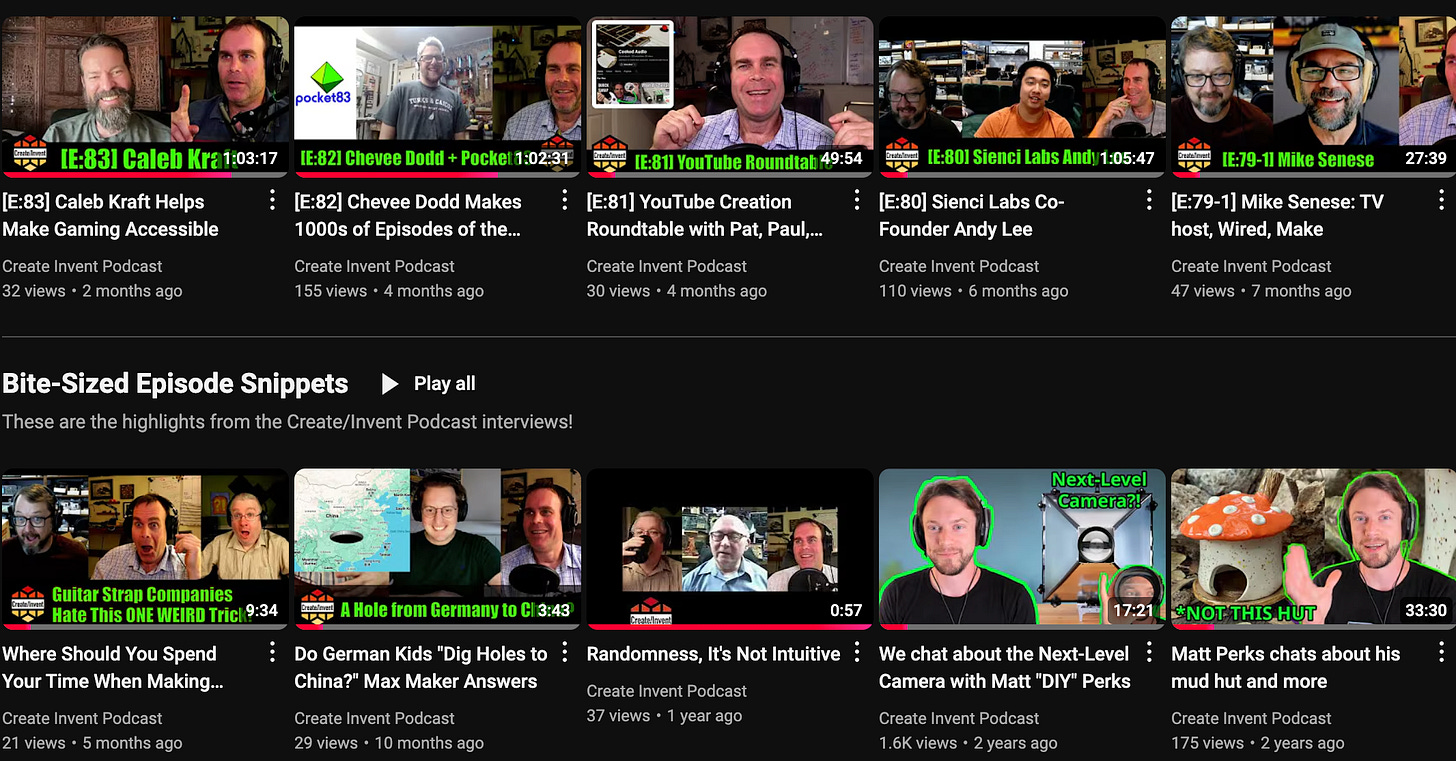My 7 Years of Podcasting: Great Success or Epic Failure?
Should I have started a podcast about making and technology? Should you? After 7 years of podcasting and 83 episodes I have some thoughts
As you may or may not know, since September 9th, 2017 I hosted a podcast called The Creativity Podcast, which morphed into the Create/Invent podcast for a bit more technical feel. It was first Audio-only on Soundcloud, then we added video for YouTube.
Seven years, and between 2 to 4 co-hosts later, I’m taking a bit of a sabbatical. Maybe hanging up this particular project for good. Was it a success? Was it a failure? Should you start a podcast?
TL;DR: it’s been a bit of a mixed bag. Read on for more details on the pros1 and cons as I see them after spending roughly 7 years in the pursuit.

Podcasting: direct financial benefits 👎
Did I make any money podcasting? The short answer is no. Breaking things down:
The Create/Invent podcast had a paid membership page on Patreon. In total we collected $1,113.85 over the years, which I think is after fees. That is a nice chunk of change all at once, however, consider that SoundCloud, the hosting service that we use, costs $144 per year by itself. Add in other fees, expenses, and of course our time, and we definitely didn’t break even.
That being said, it’s amazing that people were willing to support us with their hard-earned money to defer some of this cost. My hat off to those that listened and did so!
Considering all the hours we put in, in terms of immediate $/hour the podcast was a failure. But that’s not the whole story…
Networking and friendships 👍
In this respect, running a podcast was a great success. I met many people who I wouldn’t have had the opportunity to converse with otherwise, some of whom remain friends to this day. I’m going to miss this part of the experience. Here are just a few people that I got to talk to:
Max Maker - The show’s original host (along with myself) and the person who had the idea for the podcast in the first place. He actually invited me to his wedding in Germany in 2022. However, with a new 0-year-old in the house, it wasn’t possible for me to attend. That was the right decision, but it still really bummed me out.
Pat Regan - The show’s second co-host, and a really knowledgeable guy on a lot of fronts. He helped take the show from really lackluster video to a much better production value. He also inspired me to improve my video production in general.
Mike and Ryan of Physics Anonymous and Matt Perks of DIY Perks - joined the show on multiple occasions. They were all a lot of fun to talk to.
Pocket83 - joined us on the show several times, and actually helped host the last episode we recorded. I still don’t know what he looks like, though I do know that his real name is Seth, no, wait is is Phil? Or maybe his name is actually Pocket in the same way that Tiffany’s actual name is Trinity in The Matrix Resurrections.2
And lots of other awesome people that I won’t mention here!
Life lessons from podcasting 🎙️🫡
Have a great partner - Whether in podcasting or life in general, having someone to lean on and back you up on/talk you out of decisions is a great thing. Specific to podcasting, whether it was Max, Pat, Paul (AKA, Mr. Four Bits), or even Pocket83 (that one time), being able to say “we” also sounds a lot better than “I” when trying to line up guests. It’s also nice to be able to slide in and out of the “lead host” role as appropriate.
A lot of cool people just might not have the time for you. That might sound insulting to both you and them, but that’s just the truth. I’ve gotten to interview some really interesting people, some whom could be considered at least minor celebrities. To be honest, I’m not sure why some of the guests came on. Either way, don’t hold someone’s lack of time against them, and be grateful when people do decide to spend this precious resource with you (whether that be friends or strangers).
Have something to offer - It’s hard to ask people to be on a podcast–or to do anything else–when you know that it most likely won’t be worth their time. Try to present some value when you can. Barring that, if you’re going to ask favors of people, be ready to do favors for them (and/or others) too. It doesn’t have to be a quid pro quo3 per se, but be sure you’re the “favor doer” and “pay it forward” sometimes too!
Recording a podcast is easy! (the rest is hard) 😬
While there are some technical hurdles to making a podcast–especially involving guests over the Internet–we were eventually able to get things mostly working. We used Zencastr, then Riverside.fm for recording, which both split things up on separated audio and/or video tracks.
With the recording in-hand (so to speak) you then have to edit in your jingle, cut out coughs, line up each track, compensate for any timing variation due to technical issues, maybe mix in some images/video clips as appropriate in the video version, sync the video with audio... make thumbnails, add timestamps, publish on YouTube as well as other/audio platform(s) and hope that it propagates/catches the interest of whatever algorithm. Also, chop it up into clips for more people to discover. None of these tasks are hard by themselves, but taken together, over and over, it gets very tedious.
Lining up a time for you, a co-host, and a guest to talk can be difficult, and takes up a good chunk of two hours or so that has to be scheduled. Not only is it inconvenient for you, you’re asking a lot from whoever you are going to have on the show. It is tough to justify asking someone to give up a chunk of their time/life, especially if you can’t say how many people are listening… even if you’re pretty sure everyone will have a good time.
Podcasting mistake: inconsistency & poor statistics 📈
Today there are literally millions of podcasts available. Per ChatGPT, the number of podcasts stands at a staggering 4.36 million, though “only” around 750,000 are active. That is a lot of competition, and even in 2017, when we started, there were around 500,000 putting out content regularly. Unless you’re already famous, you have to do a REALLY good job and commit in order to rise above the crowd.
You may be talented and/or have something to offer, or get great guests. Arguably we met these criteria to one extent or another, however, we never had the full commitment needed to really make it grow. It was always a side project for my partners and I.
Based on SoundCloud and YouTube numbers, we generally estimated a few hundred regular listeners, but we really have no idea. Going to a potential advertiser with “hey a couple hundred people… or maybe a couple thousand listen” isn’t a great way to maximize your perceived value.
If we had committed to the podcast, set up proper statistics (somehow), and thus been able to secure regular sponsors, maybe we could have done quite well. There is nothing wrong with a side project, but define your goals before committing major time to something.
Bottom line: is podcasting worth it? 💰🚀
For me, podcasting has been a bit of a mixed bag. I’ve made several good friends, and in some cases connections I made via the podcast helped me in (actual) money-making endeavors. I’m also a far better interviewer and presenter than I was at the beginning of this process, which has certainly helped me do other things, such as this Arduino course.
And who knows what this will lead to in the future. If a company wanted to hire me to do an interview show, I’d have a great resume to show off. Or maybe they’d even find me through this archive.
More directly, the podcast helped me get out there more in the public sphere. As discussed in this AI writing post4, it will be even more important in the coming years to have a personal connection/reputation with your readers/viewers.
Should YOU start a podcast in 2025?
Maybe, but consider your goals beforehand. There is nothing wrong with podcasting to meet people, learn skills and/or hang out with friends, but if you’re trying to build or support a business, really consider the (time/monetary) costs. Also, count on spending way more time doing stuff related to your podcast than you do podcasting (and/or figure out a system to help streamline everything).
Good luck whatever you decide, and if YOU have a podcast you’d like to promote and/or one that people should check out, feel free to drop a link in the comments.
Thanks for reading! I hope you will follow along as I post weekly about engineering, technology, making, and projects. Fair warning: I am a native Florida man, and may get a little off-topic in the footnotes.
Note that any Amazon links are affiliate
Addendum/Footnotes:
“Prons and cons” if you’re the one guy from Ghosts. Or one person(?) that was spamming me on Twitter…
The Matrix: Resurrections was a disappointing movie. I’m not disappointed that it wasn’t a great movie; it was better than I anticipated.
What was disappointing is that at one point it seemed to be going in a really cool direction, drawing the audience into to a sort of meta-movie world where you were seeing a window into the making of the movie and how it would be chewed up by executives and made into something not that great by them, and that you were somehow a part of it… but then it kind of dropped that bit… or maybe this was some sort of meta-meta-movie move, since at that point the movie goes back to being rather average?
To be fair, it’s been a while since I saw it. And I watched in segments. It’s hard to compete with the original unless it’s The Godfather or Star Wars.
As Hannibal Lecter would say




I'll need to ask your advice if/when I take on a limited series!